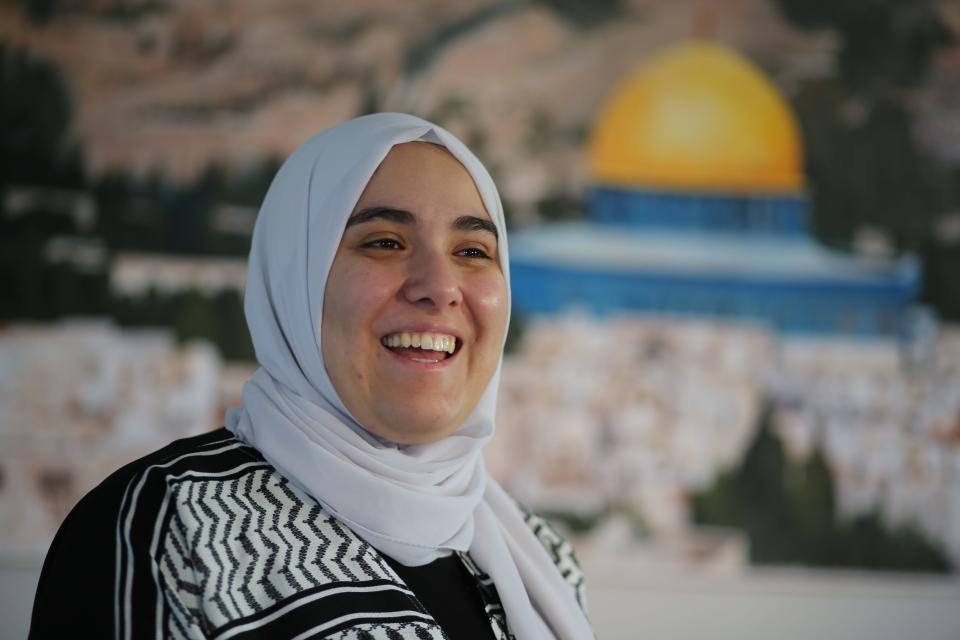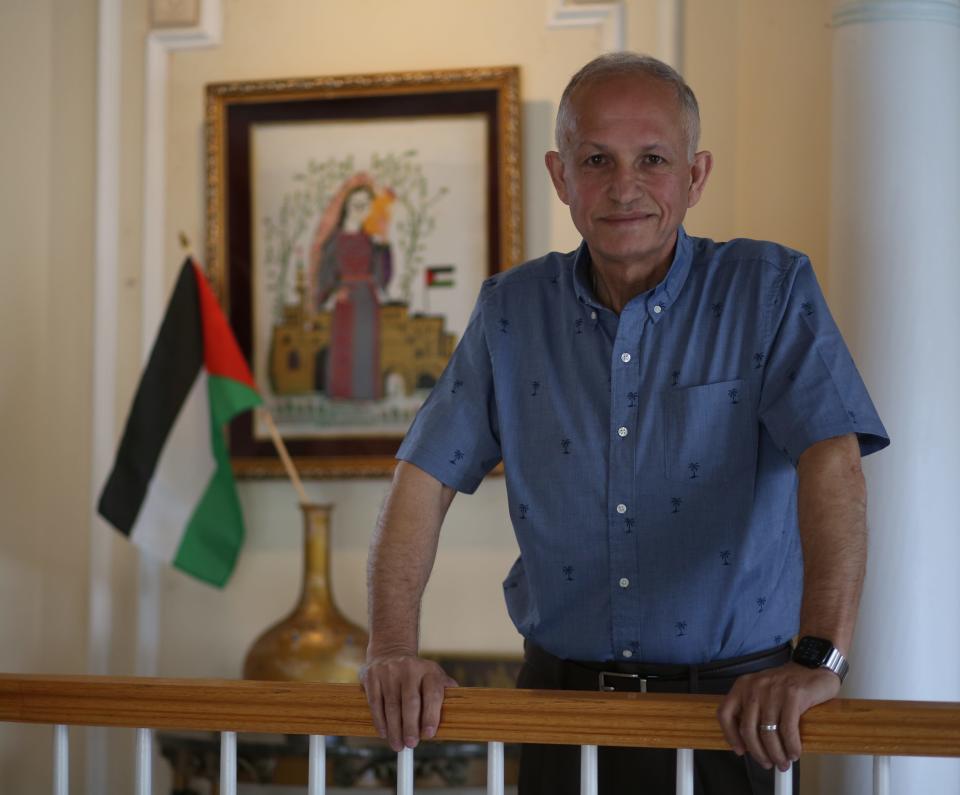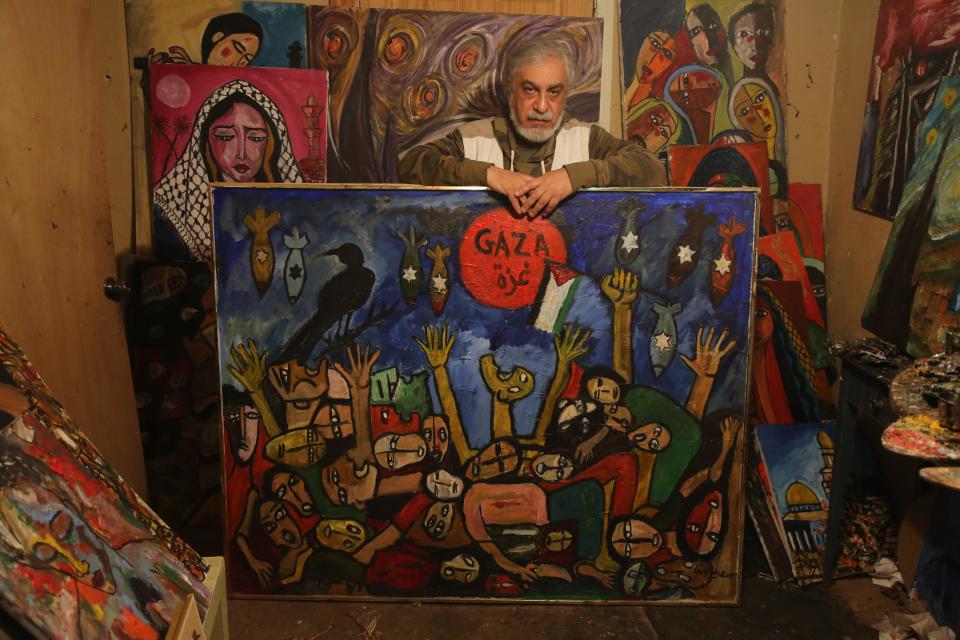'Palestinians have not lost hope': 75 years after Nakba, diaspora in NJ seek homecoming
Dawud Assad heard tanks rumbling toward his village about 3 miles outside Jerusalem and ran to the roof to get a view. There, he passed bullets to his uncle, who tried to hold off the paramilitary fighters for villagers to escape to the east.
But the barrel of the rusty World War I-era gun overheated. He bolted down an outdoor flight of stairs, while a pair of fighters entered the home. They found his uncle hiding in a bedroom, but Assad kept running until he fell from their sight.
On his belly, Assad crawled across a trench, feeling his hair stand on end as he sensed the bullets soaring overhead. After reaching safety, he learned that more than 100 villagers had been killed. They included his uncle, grandmother and 2-year-old brother.
“Sometimes I dream about how it was. You know, my grandmother, she brought us up. We were her children. 'Waladi,' she called us, [meaning] my sons,” said Assad, 91, of Monroe Township. “They threw their corpses in a dry well. We did not have a chance to give them a good burial.”
The attack in his village of Deir Yassin on April 9, 1948, proved pivotal in the Arab-Israeli conflict. Reports of a massacre quickly spread and sparked panic.
The event was part of the "Nakba," the Arabic word for "catastrophe." It refers to their expulsion from and the destruction of hundreds of villages and cities in 1948. By the war’s end, some 750,000 Palestinians were forced to leave their homes or fled in fear.
On May 15, Assad and others in the Palestinian American diaspora will mark 75 years since the Nakba.
For Jews who moved to the new state of Israel to escape antisemitic persecution, it was a hopeful time. Many had fled the horrors of the Holocaust and dreamed of establishing a nation-state that could be a safe haven for the Jewish people. But for Palestinians, it marked the start of a 75-year life in exile and a long struggle for statehood. They view the Nakba as an enduring trauma, as Palestinians continue to face displacement from their homes today.
More: Israel at 75: Ex-soldier, Muslim leader and others reflect on the Jewish state's legacy
Nakba survivors including Assad are eager to share their stories, wanting to record a part of history they feel has been overlooked or hidden.
Palestinian diaspora congregates in New Jersey
Like thousands of Palestinians, Assad found a home in New Jersey, where he arrived in 1951 to go to college and study mechanical engineering.
Palestinians had immigrated to the U.S. in the late 1800s seeking economic opportunity along with other Arabs from the Levantine region. Another wave arrived after the war in the mid-1950s, including refugees who waited in the West Bank, the Gaza Strip and neighboring countries for a chance — never granted — to return home. Immigration spiked amid each new flare-up of fighting over the years, explained Rania Mustafa, executive director of the Palestinian American Community Center in Clifton.
Newcomers found economic opportunity in New Jersey and spread the word to family members, who followed in their footsteps. Refugees also made a home in the metro areas of Chicago, Detroit, Brooklyn and Los Angeles. Finding a shared community was “integral to being Palestinian,” Mustafa said.
“We are family-oriented and focused on community,” she said. “There is an emphasis on 'we.' You are a member of a bigger tribe and village, and that is something that Palestinians feel. You never function alone. You have family and community supporting you.”

The South Paterson area — nicknamed “Little Ramallah,” after a West Bank city — became a hub for the community. Palestinian-owned stores, businesses and restaurants line the streets here, displaying flags and photos of Jerusalem on their walls. In 2022, the city renamed a part of Main Street that runs through the business district to “Palestine Way.”
As a people in exile, they express a shared feeling of being rooted in two places. Their public displays of pride are a rebuke to efforts to try to define or deny their existence, according to Mustafa.
“What you see in Paterson is this active resistance in terms of holding on to our identity,” she said. “We may not be in Palestine, but it is in our hearts and our minds.”
For Assad, Paterson is a familiar place. His family fled to Jericho in the West Bank, then went to Jordan, but he’s lived most of his life in New Jersey. He visits South Paterson to eat and shop for Palestinian foods and attend festivals and meetings. Sometimes he prays at a local mosque led by an imam who is also a member of the diaspora and grew up in a refugee camp.
Assad has also sold copies of his self-published book in local stores. In “Palestine Rising,” he details his experiences in 1948 and his journey as a refugee.
The Palestinian Catastrophe in 1948
It wasn’t just the attack on Deir Yassin that scared people. Tensions had been building for years, amid disputes over mass immigration from Europe and over land ownership. Bouts of violence erupted between Arabs and Jews.
Before the rise of Zionism, Jews made up between 2% and 5% of the population of the land. In the early 1900s, thousands of Jews began to settle the area, mostly from the Russian Empire. Immigration later soared with the rise of Nazism.
In November 1947, the United Nations adopted a plan to partition the land — called Mandatory Palestine under British rule — into Jewish and Arab states. Jews accepted the plan, which gave them a majority of the land despite their making up less than a third of the population. The Arabs rejected it. Civil war broke out.
Ibrahim Ebeid recalled the fighting and the tensions that led up to the Nabka. He saw bombs go off at a marketplace. On Palm Sunday in 1948, he was attending church and heard bombs dropping outside. The churchgoers stopped their prayer procession and left. Soon after, his family fled their city of Jaffa and moved in with his grandfather in the town of Birzeit.
“Because of the violence, everyone was living in fear,” said Ebeid, 87. “Nobody was protecting us. The British were there, and they did not protect us. Bombs were all over. Massacres were committed.”
On May 15, 1948, the day after the British Mandate ended, Zionist leaders declared the creation of the state of Israel. Arab armies invaded, and the Arab-Israeli War began. Israel won the war but did not permit refugees to return, despite U.N. resolutions emphasizing a right to return.
Ebeid’s father, a lawyer at Jaffa, harvested olives and relied on U.N. support for his family’s survival.
But Ebeid could not stay. As an activist in the pan-Arab nationalist movement, which advocated for political and cultural unity across Arab states, he had been arrested several times and felt at risk. In 1960, he moved to New Jersey, settling in West New York. About 10 years ago, he moved to Chicago to be closer to family.
He worked on Wall Street but stayed involved in activism for various Arab causes, especially against the U.S. wars in Iraq. He also worked with Black and American Indigenous movements.
In 2018, he self-published a book, “My Roots are Deep in Palestine,” about his experiences. Like other Palestinians, even many years removed from the land, he wants to return.
“Everyone wanted to go back. Even now, if they allow us to go back, I will go,” he said.
‘Where is our home?’
For Aref Assaf, 65, of Denville, the Nakba was an event that doomed the family to a life in limbo, steeped in poverty. Raised in the Qalandia refugee camp north of Jerusalem, he lived with his parents and siblings in a single-room, stone structure with a tin roof, relying on United Nations aid for survival.

“We had nothing,” Assaf said. “Imagine winter months, not having medical care, the chaos, disorganization, crowding. Imagine having no running water or electricity. I lived like that for the first 15 years of my life.
“I remember always asking my parents why we are forced to have to live in refugee camp," he said. "Where is our home? What happened to it? That would bring them to tears, that they would have to relive what they lost.”
His father spoke of their sprawling land, where they grew tomatoes, cucumbers, grapes and figs and raised cattle and sheep. They did not feel afraid or worry that their village could be taken “until the day it happened,” Assaf said.
In the 1967 war, Assaf saw Israeli soldiers shoot and kill his brother, who was 11.
They were playing in a field near a chocolate factory when they saw the soldiers. The boys ran. The soldiers shot Assaf's brother in the back.
His parents spent their lives trying to recover his remains from authorities, Assaf said.
"I remember my father going from one hospital to another," Assaf said. "He was told he was in a mass grave with others, but there was no documentation of where he was buried or what happened to him. They died never being able to bury him."

Desperate to leave the camp, he saw education as his way out. A top student at his U.N.-run school, he got scholarship offers and, in 1977, enrolled at Drew University in Madison, New Jersey. Later, he got a master’s degree at the London School of Economics and a Ph.D. in international law at Columbia University.
He tried to go back. He sold his belongings and got a teaching job at Birzeit University but was barred from entering as he tried to cross into the West Bank from Jordan. Although he has visited over the years, Israel has not allowed him to move back permanently. To this day, he continues to renew his annual application to join family members who remain in the West Bank. Last year, it cost $275 to reapply.
On one visit, he went to the land where his family once lived. Part of the house had collapsed, and the property was used for chicken farming. A nearby one-room schoolhouse was converted to a bar, he said.
He writes about his family’s struggle in op-ed pages and speaks out for Palestinian rights as president of the Arab American Forum.
“For some to deny what we went through is denying history. It’s unjust,” he said.
When will the Israeli-Palestinian conflict end?
Palestinians view the Nakba as an ongoing struggle. Israeli settlements have swallowed swaths of the West Bank, eroding the possibility of a contiguous Palestinian state. Sixty percent of the West Bank is now under Israeli control.
Some far-right leaders in the new government have openly called for the settlement of all the West Bank — an area that they believe is their destiny and refer to by the biblical names Judea and Samaria. The stance puts them at odds with Israel’s liberal citizens, many of whom have called to end the West Bank occupation.
United States leaders say they continue to support a two-state solution. Meanwhile, calls grow for a one-state solution that affords equal rights to all, including West Bank residents. Such a solution would undermine Israel’s Jewish character and security, say critics of such a plan.
Despite the dire situation, the Nakba survivors have hope. They see Israelis divided over expansionism. They see younger generations sympathize with their plight.
“Action must be taken to correct the mistakes of history,” Assaf said. “Palestinians have not lost hope in the dream of the homeland.”
The formation of Israel, 75 years later
The creation of the state of Israel is a complex issue on both sides. For the Israeli perspective, NorthJersey.com and the USA TODAY Network interviewed a cross-section of tri-state area residents with unique ties to Israel. Read their stories at NorthJersey.com.
This article originally appeared on NorthJersey.com: Nakba Day 2023: NJ Palestinians recall violence in 1948

